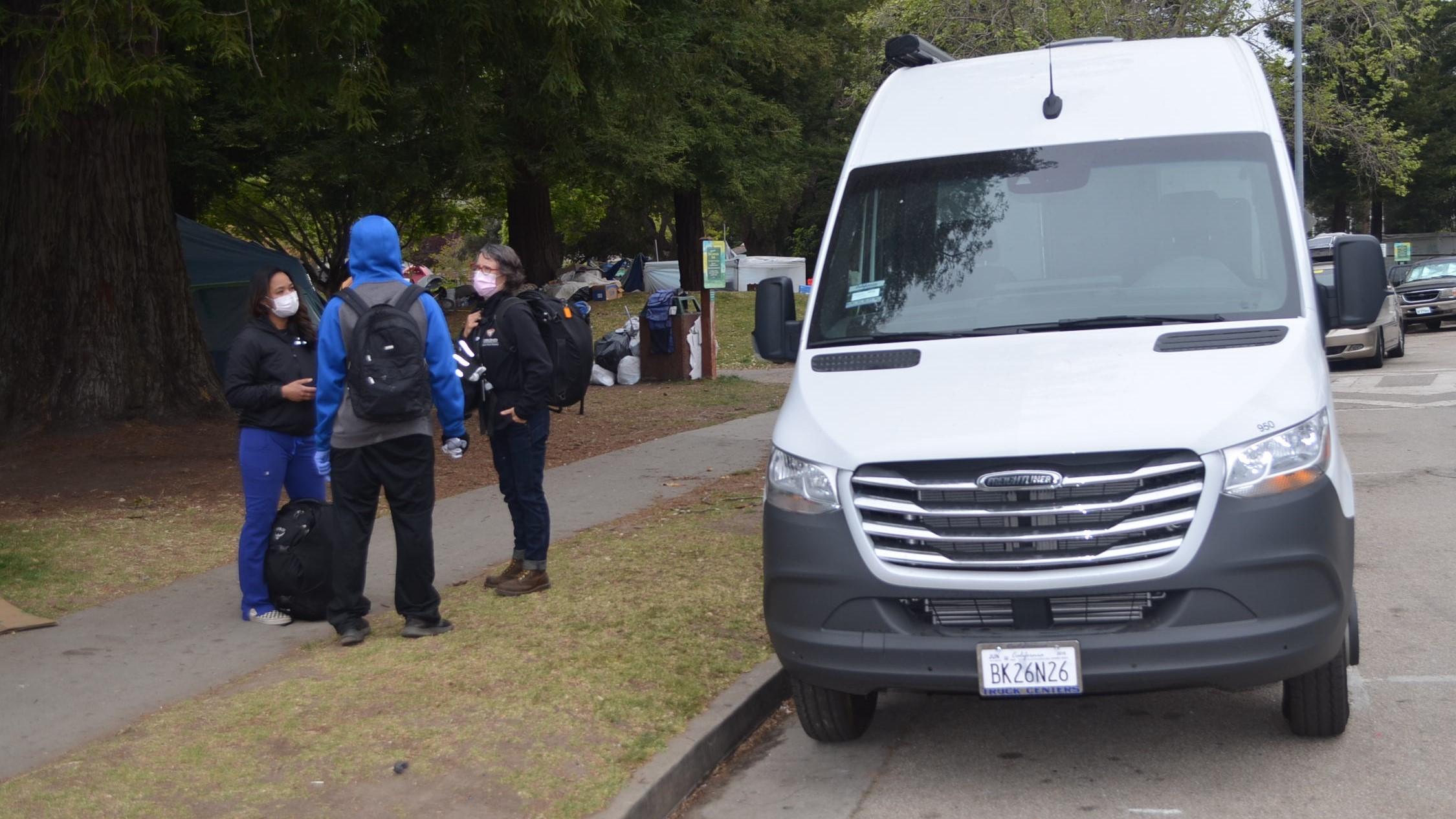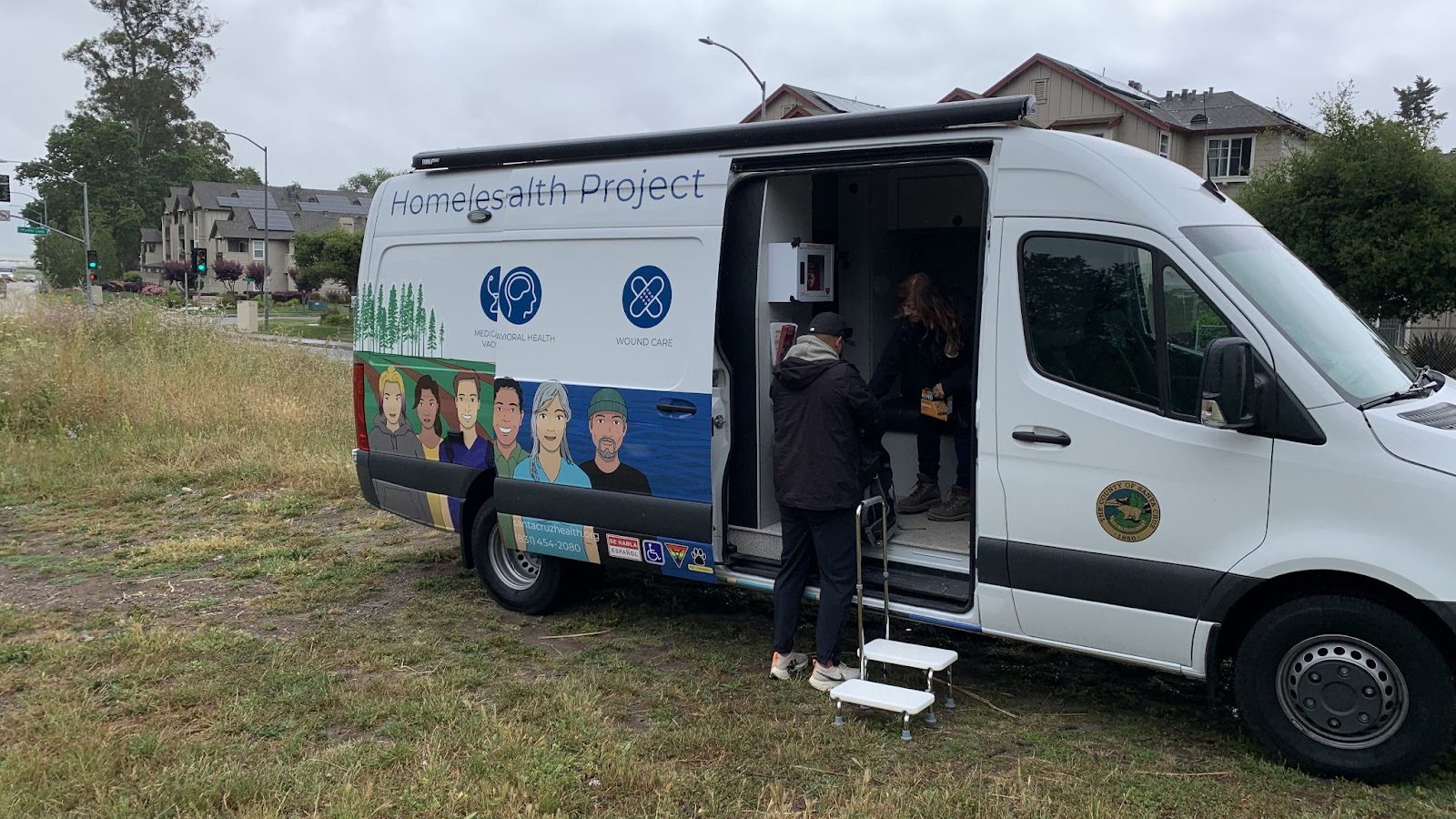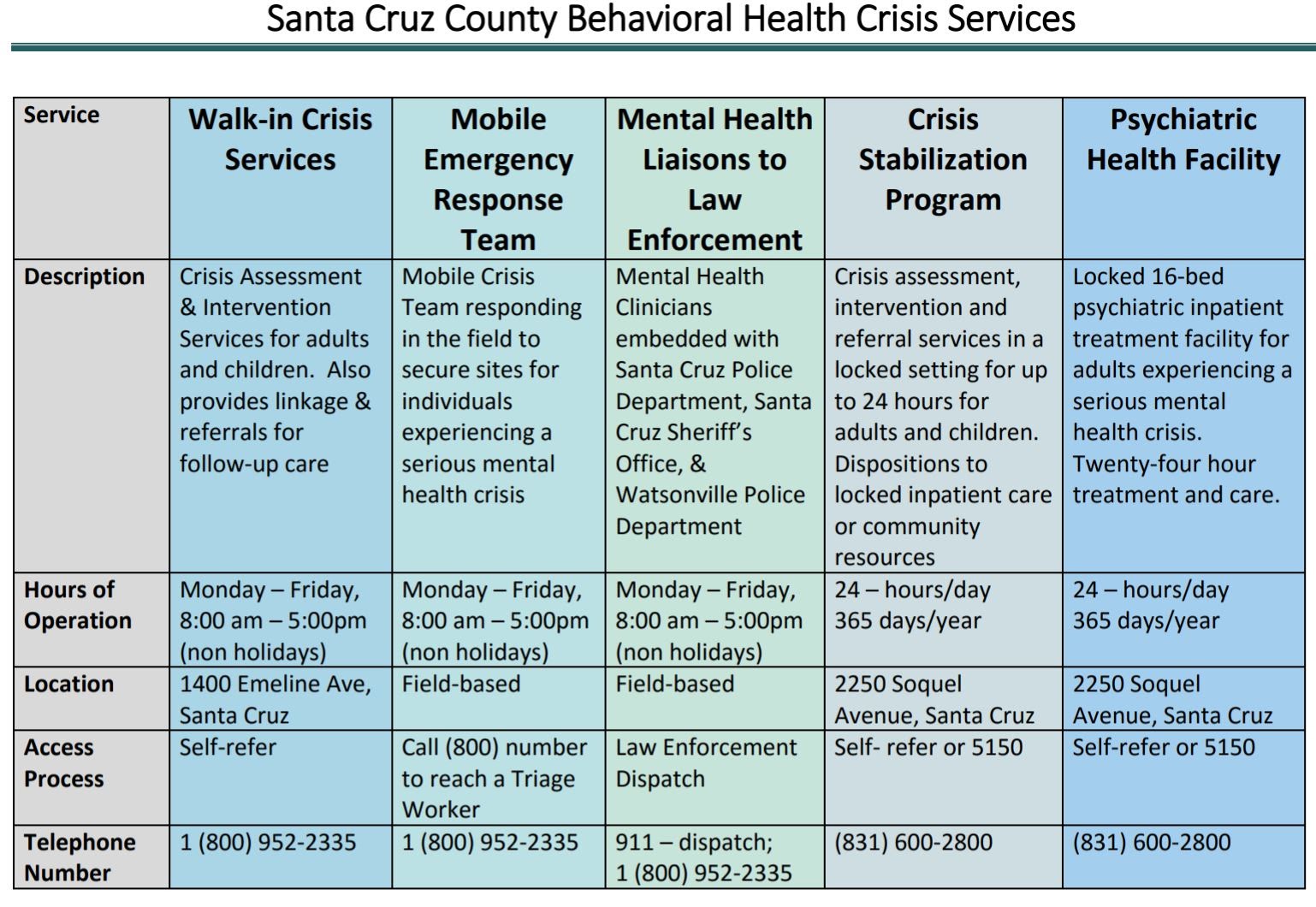Last updated: October 2023
Jump to read about each mental health crisis service in Santa Cruz County:
- Crisis Now (full implementation due mid-2027)
- Mobile Emergency Response Team
- Mobile Emergency Response Team for Youth
- Homeless Persons Health Project
- Law enforcement in Santa Cruz County
- National Alliance for Mental Illness (NAMI) Santa Cruz County
- Access Team, Santa Cruz County Health Services Agency
- Mental Health Client Action Network (MHCAN)
Many Santa Cruz County residents said they want to know who they can call for help with mental health crises other than law enforcement.
The Santa Cruz County Board of Supervisors in June 2023 approved an overhaul of the way mental health crises can be handled in the county. The new program, called Crisis Now, is expected to make mobile crisis teams available 24 hours by mid-2027.
Crisis Now has not started in Santa Cruz County as of late October 2023. Contracts with nonprofit groups to advance the program are expected no sooner than January 2024, said Jason Hoppin, a spokesperson for the County of Santa Cruz.
Crisis Now (full implementation due mid-2027)
Crisis Now is expected to include a new dispatch system to simplify responses to mental health crises. Dispatchers are expected to be able to send a mobile crisis team if needed, regardless of whether people call 911, the Suicide Prevention Service at 988 or other emergency numbers. The improved dispatch system will also involve more cooperation between dispatchers, mobile response teams and psychiatric facilities, said James Russell, senior behavioral health manager for the county, in June 2023.
The Crisis Now mobile crisis response system is expected to include three levels of response:
- For lower-level crises, teams include two peer specialists, or one peer specialist and one emergency medical technician, or EMT.
- For crises that may require an involuntary psychiatric hold, teams include a licensed mental health clinician with a peer specialist or EMT. If mental health workers determine a patient is a danger to themselves or others, the patient could be held at a crisis stabilization facility for up to 72 hours.
- For situations that include safety concerns, the crisis team would co-respond with law enforcement.
The program tries to ensure that more people in mental health crisis can access mobile crisis care and short-term stabilization programs instead of being directed to emergency departments. Crisis Now emphasizes a “no wrong door” approach, where people in a mental health crisis can call any emergency number, or go to any crisis facility, and receive help.
County leaders plan to partner with a nonprofit group to hire and train 12 to 24 certified peer specialists and emergency medical technicians to work alongside licensed county mental health clinicians.
Contracts with nonprofit groups such as RI International are expected no sooner than January 2024, said Jason Hoppin, a spokesperson for the County of Santa Cruz. RI International helps shape the delivery of mental health and substance use crisis services, according to its website.
The Crisis Now plan is also expected to improve the organization and operation of the Crisis Stabilization Program. The program now has capacity for 12 clients in crisis at any given time. Santa Cruz County contracts with Telecare Corp. to operate the facility, which admits about 100 people a month. About half of admissions are people on involuntary psychiatric holds brought in by law enforcement.
Crisis Now is expected to cost $5.1 million over the next three years, paid for with state and federal money.
Mobile Emergency Response Team
The Mobile Emergency Response Team, or MERT, is run by the County of Santa Cruz. Weekdays during the day, people who are in mental distress or witnesses of mental crises can call the county’s Behavioral Health Division at 1-800-952-2335 and a staff member will respond during business hours and direct a person to the appropriate resources.
MERT staff are available for phone crisis support, but mobile emergency response is available only to controlled locations such as schools, hospitals, or Boys & Girls Clubs, said Carl Graue, Mobile Emergency Response Team supervisor. Staff offer referrals and therapy from licensed clinicians or peer support providers directly overseen by clinicians.
Some calls will be responded to with a mobile emergency response depending on the situation. Other calls can be referred to law enforcement, paramedics or include transportation to the county’s crisis stabilization unit at 2250 Soquel Ave., Santa Cruz.
- Contact and hours: Call 1-800-952-2335. A staff member answers calls 8 a.m. to 5 p.m. weekdays, though Graue said a caller is more likely to receive an answer before 4 p.m., and MERT teams are available during these hours. Outside working hours, an answering service will offer referrals and other services. Staff said they are trying to hire more people to expand hours.
- Vehicles: The service uses a mix of vehicles. Some vehicles can provide locked transport.
- Services: In 2021, MERT responded to homes, homeless camps, streets, shelters and other areas. Because of a staff shortage as of October 2023, “We’re only able to respond to facilities, schools, programs, Boys & Girls Clubs, that kind of thing. We’re not as able to respond directly to homes,” Graue said. He said he hopes to add staff to expand response locations and hours. Some calls to MERT are now redirected to law enforcement mental health liaisons.
- Number of clients: The program serves about 150 people each month on average, Graue said. Numbers fluctuate depending on various factors, such as the time of year and school schedule.
- Other info: Law enforcement occasionally calls on the Mobile Emergency Response Team to respond and vice versa. “If there’s anyone acting out violently, it has to go through 911. We can’t respond to people acting out” that way, said Graue.
- Funding and funding sources: Mobile Emergency Response Teams for adults and youth are funded through a combination of grants, funding from the Mental Health Services Act, federal money and money from the state’s AB109 realignment law.
- Shortcomings: Critics have said the 800 number is not well known by families with mental health patients. The hours don’t cover nights and weekends and there are misconceptions that the service only responds to registered county mental health patients. The service doesn’t respond directly to homes, encampments, shelters and other places mental health crisis calls are likely to come from.
Mobile Emergency Response Team for Youth (MERTY)
Santa Cruz County residents 21 and younger with mental health needs can call a hotline and county-employed bilingual licensed clinicians and a “family support partner” will respond in a van. MERTY is not equipped to evaluate youth for hospitalization. The team provides services at schools, after-school programs, faith-based organizations and “other community settings,” according to the MERTY website.
Some calls will be responded to with a mobile emergency response depending on the situation, said Carl Graue, Mobile Emergency Response Team supervisor. Other calls can be referred to law enforcement or paramedics, and in some cases MERTY can provide locked transport to a hospital.
- Contact and hours: Call 1-800-952-2335. A staff member answers calls 8 a.m. to 4 p.m. weekdays. An answering service answers calls outside those hours.
- Vehicles: Two sprinter vans with desks, chairs and wheelchair lifts.
Homeless Persons Health Project
People who are homeless can request mental health services from the Homeless Persons Health Project, a Santa Cruz-based clinic. Teams of two to six or more county mental health client specialists and public health nurses most days visit homeless camps throughout the county. The team is not dispatched to mental health crises, but rather it visits large homeless camps and provides toiletries, food, water, medical supplies, mental health services and links to other county services such as Homeward Bound bus tickets.
Staff often connect unsheltered people with county mental health services before crises happen. They build relationships and often know people by name. The project also runs a health clinic that offers many other services, including primary and emergency medical care and connections to supportive housing.
More information about the Homeless Persons Health Project.
- Contact and hours: Services are provided Monday through Friday at the Rebele Family Shelter building at 115-A Coral St., Santa Cruz. Call 831-454-2080 or 800-731-4747 on weekdays. After hours, established patients only can call 831-454-5146. Open hours are:
- 8 a.m. to 12 p.m. and 1 p.m. to 5 p.m. Mondays and Wednesdays.
- 1 to 5 p.m. Tuesdays and Thursdays.
- 8 a.m. to 12 p.m. and 1 p.m. to 3 p.m. Fridays.
- Vehicle: The team uses a white van to provide medical services.
- Number of clients: About 400 clients are served on average each month.
- Other info: Federal and county money has supported the program in Santa Cruz County since 1989. The Public Health Services Act funds the majority of the program with some support coming from the county’s General Fund. The state’s Homeless and Housing Incentive Program recently provided $900,000 to Homeless Persons Health Project’s street team through Central California Alliance for Health.

Public Health Nurses Marie DelRosario, left, and Suzanne Samson of the Homeless Persons’ Health Project talk to a man during a visit to a homeless camp on Dakota Avenue in Santa Cruz in April 2021. (Stephen Baxter — Santa Cruz Local)

The Homeless Persons Health Project offers mental health referrals and some medical services. (Homeless Persons Health Project)
Law enforcement in Santa Cruz County
Anyone having or witnessing a mental health emergency can call 911 for help and law enforcement will respond, said Santa Cruz County Sheriff’s Office spokeswoman Ashley Keehn.
Callers can request a deputy or officer trained in crisis intervention or “CIT,” of which the majority are trained, Keehn said.
Some residents have asked for non law enforcement responses to mental health crises after law enforcement officers shot and killed two people in separate mental health crises in Santa Cruz County in 2016. A Santa Cruz police officer killed a 32-year-old Santa Cruz man during a mental health crisis, and a Santa Cruz County sheriff’s deputy killed a 15-year-old Aptos High School student on LSD that year.
Calls to 911 are handled by different law enforcement agencies depending on the location of the incident in Santa Cruz County.
- In unincorporated areas of the county such as Live Oak, San Lorenzo Valley, Aptos, Freedom, the Santa Cruz Mountains and the North Coast, Santa Cruz County sheriff’s deputies respond. A mental health liaison from the county’s Health Services Agency may accompany the deputy 8 a.m. to 5 p.m. every day.
- Santa Cruz and Watsonville police have additional mental health liaisons that can respond about 8 a.m. to 5 p.m. weekdays.
- Scotts Valley and Capitola police do not have mental health liaisons but can call on county-employed mental health liaisons.
Services
- Contact and hours: 911, 24 hours
- Vehicle: Mental health liaisons show up in county vehicles accompanied by a deputy in a marked patrol vehicle.
- Other info: If a client meets criteria for an involuntary psychiatric hospitalization for up to 72 hours, also known as a “5150 hold,” the person can be taken to the county’s contractor-run Crisis Stabilization Facility or Psychiatric Health Facility, both at 2250 Soquel Ave., Santa Cruz. There are only 12 beds and patients may be sent to other facilities out of the county. Overflow patients can also be sent to local emergency rooms. Patients are often assessed within 24 hours, but may be kept up to 72 hours in the facility. Patients also can check into the facilities for services voluntarily. Visitors cannot visit patients, according to the Crisis Stabilization Center’s website.
- Training: Sheriff’s deputies go through yearly Integrating Communications, Assessment and Tactics training for contacting people experiencing a mental health crisis,” said Ashley Keehn, spokesperson for the Santa Cruz County Sheriff’s Office. “If someone is in a mental health crisis, they can absolutely call us at any time of the day.”
- Shortcomings: Critics say officers and deputies may be emotionally or physically drained from crime-related calls and may approach mental health crises with varying levels of patience and expertise. Some residents have asked for non law enforcement responses to mental health crises after law enforcement officers shot and killed two people in separate mental health crises in Santa Cruz County in 2016.

The Mobile Emergency Response Team typically finishes work at 4 p.m. weekdays, said the team’s supervisor, Carl Graue. (County of Santa Cruz)
National Alliance for Mental Illness (NAMI) Santa Cruz County
- A helpline at 831-427-8020 is not a live number, but people can leave a voicemail and someone will return the call within 24 hours. Return calls can provide emotional support, referrals to NAMI services as well as those of other agencies, guidelines for calling 911 and a warm handoff to other mental health services in Santa Cruz County.
- The Spanish-language NAMI helpline is 831-205-7074.
- Free classes and support groups for people dealing with mental health issues as well as their relatives supporting them.
- More information about the NAMI helpline.
Access Team, Santa Cruz County Health Services Agency
- Mental health services and urgent care are available 24 hours at 831-454-4170 or 800-952-2335.
- Bilingual mental health clinicians and psychiatrists provide assessments by appointment. Other mental health services, including referrals to other mental health providers at clinics 8 a.m. to 4 p.m. Monday through Friday.
- Walk-in crisis services also are available at 1400 Emeline Ave., Building K., Santa Cruz and 1430 Freedom Blvd., Watsonville.
- More information about Santa Cruz County’s Access Team.
Mental Health Client Action Network (MHCAN)
- Peer support workers are trained in Intentional Peer Support, “an evidence-based method of communication that maximizes self-agency for people with serious diagnoses like schizophrenia, schizoaffective disorder, bipolar disorder, major depression, PTSD, anxiety disorder & others,” according to the MHCAN website.
- City rules allow MHCAN to operate no more than 20 hours a week and serve 50 people daily, said MHCAN Executive Director Sarah Leonard and city planner Eric Marlatt.
- Call the front desk at 831-469-0462 or visit 1051 Cayuga St, Santa Cruz.
- More information about MHCAN.
This resource page is part of Santa Cruz Local’s Police Reform Series. Read related stories:
- Podcast Ep. 81: Reducing harm in Santa Cruz County Law Enforcement — July 15, 2020
- New committees address police reform in Watsonville, Santa Cruz County — Feb. 19, 2021
- Data special: Trends in Watsonville crime, police work, funding — April 1, 2021
- State bill sets stage for new mental health crisis hotline — May 13, 2021
Questions or comments? Email [email protected]. Santa Cruz Local is supported by members, major donors, sponsors and grants for the general support of our newsroom. Our news judgments are made independently and not on the basis of donor support. Learn more about Santa Cruz Local and how we are funded.
